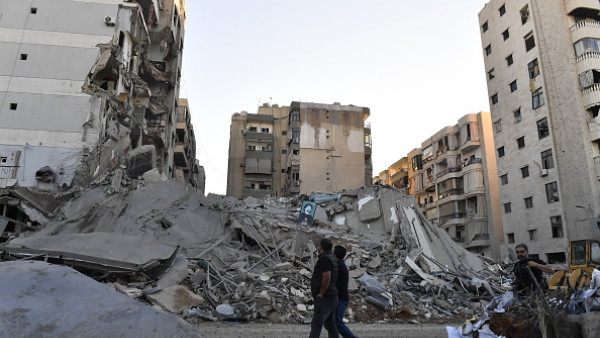Israel has left swathes of Beirut’s southern suburbs in ruins after weeks of heavy airstrikes [Houssam Shbaro/Anadolu/Getty]
The cost of rebuilding Lebanon when the Israel-Hezbollah war ends could exceed losses incurred after the 2006 conflict, according to some current estimates.
Reconstruction costs have varied but will likely keep climbing as Israel continues its aerial offensive in the country.
Israel dramatically escalated its attacks on Lebanon on 23 September, turning a cross-border conflict with Hezbollah into a full-blown war which has killed hundreds of people and forced over a million to flee.
Israel has flattened border towns and villages in southern Lebanon, destroyed entire neighbourhoods across Beirut’s southern suburbs, and wreaked havoc across many areas in the eastern Baalbek-Hermel governorate.
It has focused its attacks primarily on these three Shia-majority regions in its war with Hezbollah.
Important cities like Tyre and Nabatiyeh in south Lebanon, or Baalbek in the east, have been heavily hit. They serve as important regional and national tourist and commercial hubs.
Varying figures
Although the war is ongoing and it is currently difficult to assess the level of destruction, some international and local bodies have made preliminary estimates of the damage.
In a World Bank report published last week, Lebanon’s economic losses were estimated at $8.5 billion, including $2.8 billion in the housing sector. This only accounts for the approximately 99,000 housing units partially or completely destroyed.
The Hezbollah-affiliated Jihad al-Bina development foundation estimates a similar cost, at $2.9 billion. The US-sanctioned institution says these expenses include removing rubble as well as reconstruction.
But Lebanon’s caretaker Economy Minister Amin Salam gave an astronomical figure, saying the country will need between $20-$30 billion for reconstruction.
Mohammad Shamseddine from the Beirut-based research and consultancy firm Information International believes Salam’s numbers to be exaggerated.
As of mid-November, “we estimated the losses in the housing sector to be about $4.3 billion, as 220,000 housing units were either partially or completely damaged,” he told the Lebanese daily Annahar.
He said reconstructing one house would cost around $750,000.
The 2006 war between Hezbollah and Israel resulted in a bill of about $3 billion, according to government estimates. Then, wealthy Gulf states, including Qatar, Iran, and some Western countries helped with reconstruction efforts.
Dahiyeh destruction
As of late October, rebuilding the southern suburbs of Beirut alone will cost around $630 million, with $2.3 billion needed for other regions, according to the pro-Hezbollah Al-Akhbar newspaper.
The extent of destruction in the area is already on par with the aftermath of the 2006 war, which lasted for 33 days, according to Al-Akhbar.
Then, about 246 buildings were completely destroyed. So far in the current war, 220 have been destroyed.
The Lebanese capital’s southern suburbs, known as ‘Dahiyeh’, have been battered by the Israeli bombardment. Last week, the area was pounded nonstop for at least six days, ahead of US mediator Amos Hochstein’s arrival in Beirut for ceasefire negotiations.
But while some buildings have been levelled and certain neighbourhoods have been hit significantly more than others, it is visibly evident that many buildings have only suffered some damage to their facades.
Daily inspections in the Dahiyeh, Al-Akhbar said, show structural damage to the buildings surrounding those which have been targeted. A lot of these buildings will also have to be demolished after their foundations are weakened because of the strikes, raising the total cost when the war ends.
“If the July 2006 war model is adopted, 30 percent of the damaged buildings will be subject to demolition,” the newspaper said.
Lebanese officials have estimated reconstruction in Dahiyeh to take three to five years.

